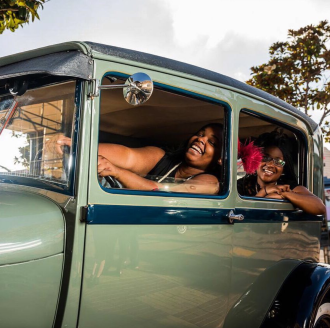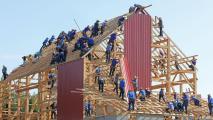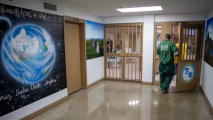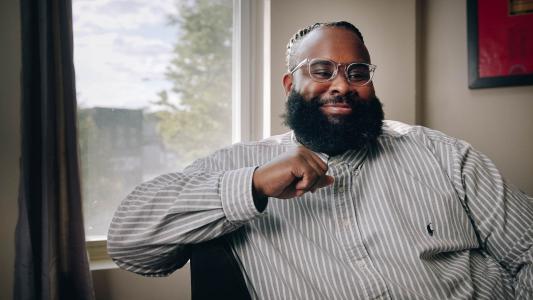It’s a few minutes before five on a Saturday afternoon in early October. At the corner of Oakdale and Mendell, in southeast San Francisco, shopping carts and liquor bottles lie strewn among the homeless. But in a nearby plaza, black iron doors welcome hungry customers into another era.
Inside this cozy, chandelier-lit space, restaurant staff fill water pitchers, light candles, and lay out white cloth napkins, as jazz legend Billie Holiday fills the air.
“This is where the magic happens,” says Teresa Goines, whose tireless faith and sweat equity brought to life the Old Skool Café, a ’40s-themed eatery in the Bayview, one of the city’s roughest neighborhoods.
The magic, says Teresa, is that you don’t see a bunch of adults doing the work. About a dozen youth in red button-downs are taking martini orders, dishing up mac ‘n cheese, punching in orders — basically running the restaurant. What makes this scene magical is that not too long ago many of these young people were involved in gangs and cycling in and out of the criminal justice system.
Teresa set out to break that cycle more than two decades ago — and her entrepreneurial journey led her to open a restaurant as an unlikely alternative to gangs and violence.
Broken System
Fresh out of college in the summer of 1997, Teresa worked as a corrections officer at the Santa Barbara County juvenile hall. She led calisthenics workouts, delivered meals, performed strip searches, and broke up fights. Sometimes, though, chatting with young offenders over a game of wall ball or while driving them to work sites or medical appointments, Teresa heard stories that broke her heart.
Not too long ago many of these young people practically running Old Skool Café were involved in gangs and cycling in and out of the criminal justice system.
“They come in acting really tough,” she says. But talking one-on-one, when “they didn’t have their buddies around to be cool in front of, sometimes you’d get the real stories of their families and their pain.” During a long car ride, one of the young men said his earliest memory was being a drug runner for his dad — “here, take this bag to Joey’s house down the road” — at age 3.
The exposure to crime at a young age is often life-altering. “Dad goes to prison, and you’re the man of the house. And you’ve got younger siblings, and you’re expected to provide for the family the way Dad taught you,” says Teresa. And if “your cousins and uncles and aunts and everybody else is in the gangs,” then joining one doesn’t seem that bad — it’s a matter of survival and a way to provide for your family. Gangs “offer (young people) employment, protection, and brotherhood.”
That’s why Teresa opened Old Skool Café — to compete with the gangs.
The café runs a 12-week training program where at-risk youth learn to bus tables, and also things like knife skills, food prep, and other aspects of running the business. The training is free, and youth who complete it successfully can apply for a job at the restaurant.
During their two-year stint at Old Skool Café, employees attend workshops where they learn practical skills such as how to find housing or apply to college. They also get a half-hour session with a life coach each week.
By providing a way to earn a living wage alongside others who “are going to walk beside you and support you,” Old Skool Café hopes to break the cycle of poverty, hopelessness, and incarceration for youth.
Slamming the Revolving Door
Although Teresa knew she wanted to disrupt the cycle of youth crime and imprisonment, she wasn’t initially set on the idea of a restaurant. Early on, she realized that a large part of the cyclical problem was that formerly incarcerated individuals have trouble finding legitimate work when they’re released, which often leads them back to their roots — back to crime — to survive. A year after release, 60 to 70 percent of ex-offenders are still unemployed. And for the youth lucky enough to land a job, they often lose it within weeks because they’re out partying and don’t show up for work, or they’ll cuss out their boss when they get in trouble.
A stable income isn’t enough, Teresa thought. These kids need support. “They need mentorship to learn how to be professional, to learn how to handle conflict in ways that aren’t violent,” she says.
One of the young men said his earliest memory was being a drug runner for his dad — “here, take this bag to Joey’s house down the road” — at age 3.
In healthy family environments, this sort of learning happens during adolescence. However, for kids growing up on the streets, “the code is, you don’t talk about your business.” After years of bottling up horrific trauma, it often comes out in violence. “And that’s why all the crimes happen,” she says. “It’s just kind of basic.”
Teresa also knew her solution must be sustainable on its own — she didn’t want to rely on outside funding. She learned this while running a gang prevention program for schools in San Francisco’s Mission District. After a year, the funding was cut and “all my kids went downhill,” she says. “They got arrested, got pregnant, joined gangs.” She didn’t want to make progress with the youth only to have them slide right back to the streets because of funding issues.
So she begged God to show her an economic solution that included community and mentoring — “something where we make our own money, where people can’t just pull the plug.” It had to hire the kids people were afraid to hire, and mentor them too.
“I started getting a vision of this place. The youth were going to run the whole thing. They’d be the hosts, servers, chefs, dishwashers, entertainment, the management.”
Learn more about Teresa and her staff and make a donation to OSC.
Visit Stand Together to see their work to help social entrepreneurs greater their good.
Hear more inspiring stories of personal transformation at Stand Together Stories.
Prayers and Perseverance
Though the vision was becoming clear, the path to bring it to fruition demanded sacrifice. In 2004, Teresa quit her job at the school district. “I decided to use my retirement savings to just go for it — to pay the kids, to live off of,” she says.
Like many small businesses, Old Skool Café had very humble beginnings. Teresa hosted pop-up events in her apartment and put on galas and fundraisers at her friends’ salsa club. As she hustled to find volunteers and free spaces, more people began asking her to cater their events. Teresa knew better than to turn down an opportunity — even if she didn’t know exactly how she would pull it off. Often times, a local chef would volunteer to help her cater; and those chefs would let Teresa’s youth help cook and serve. Her youth, decked out in uniforms from Goodwill, would show up, receive training, and pitch in. Everyone was learning about the restaurant and catering business together.
But for Teresa, her vision for Old Skool Café was much more than a restaurant. She wanted to equip the youth for success in all aspects of life — not just by providing job skills but also emotional support. So, her apartment also functioned like a drop-in center. Sometimes the youth would come after school, or on weekends, when they were hungry, bored, or sad. “For a lot of them, it was a safe place, where they knew they were loved and wanted,” says Teresa, who moved in 2006 to the Bayview, where many of the youth lived.
Teresa was making progress with the youth — and business was picking up. However, seven years after quitting her day job, Old Skool Café was still being run out of her apartment. If she was going to expand the business, she needed a building.
Eventually her perseverance paid off.
Teresa wants to equip the youth for success in all aspects of life.
At two prayer gatherings that happened months apart, pastors who knew nothing about Teresa’s situation assured her that the Old Skool Café vision was indeed from God — that it wasn’t “just my own big stupid idea” —and that God would provide all the resources and people. “That was a stake in the ground,” she says. Another stake: an abandoned church building became available in 2011. She negotiated a low rent, rallied volunteers to help renovate the space, then bought it.
Now eight years later, Old Skool Café isn’t just a location at the corner of Oakdale and Mendell — it’s a community of people who support and love each other. Teresa is thankful she didn’t abandon her wild idea of a restaurant run by at-risk youth. Despite huge challenges, creativity, tenacity and a few timely miracles made it happen. She even has plans to establish other Old Skool Cafés across the country — and wants some of the young people she’s mentored to help her achieve it.
Teresa hopes that others will be inspired to change their communities and encourages people not to dismiss ideas because the problem seems too big. Often people think “‘I’m not skilled or qualified or ‘I wouldn’t know the first thing,'” she says. “Well, nobody does until they explore it. (Thomas) Edison didn’t know how to make electricity.”
“If something pokes at you, and you feel like you have an idea…explore it. God works through creativity, and there’s still so much that hasn’t been created — solutions (are) out there.”
Stand Together helps social entrepreneurs supercharge their efforts by connecting them with passionate partners and the resources necessary to make a greater difference.
Through Stand Together’s philanthropic community, they’re tackling some of the nation’s biggest challenges so that every person has the opportunity to realize their full potential.
Learn more about getting support for your business, or become a partner today at StandTogether.org.







